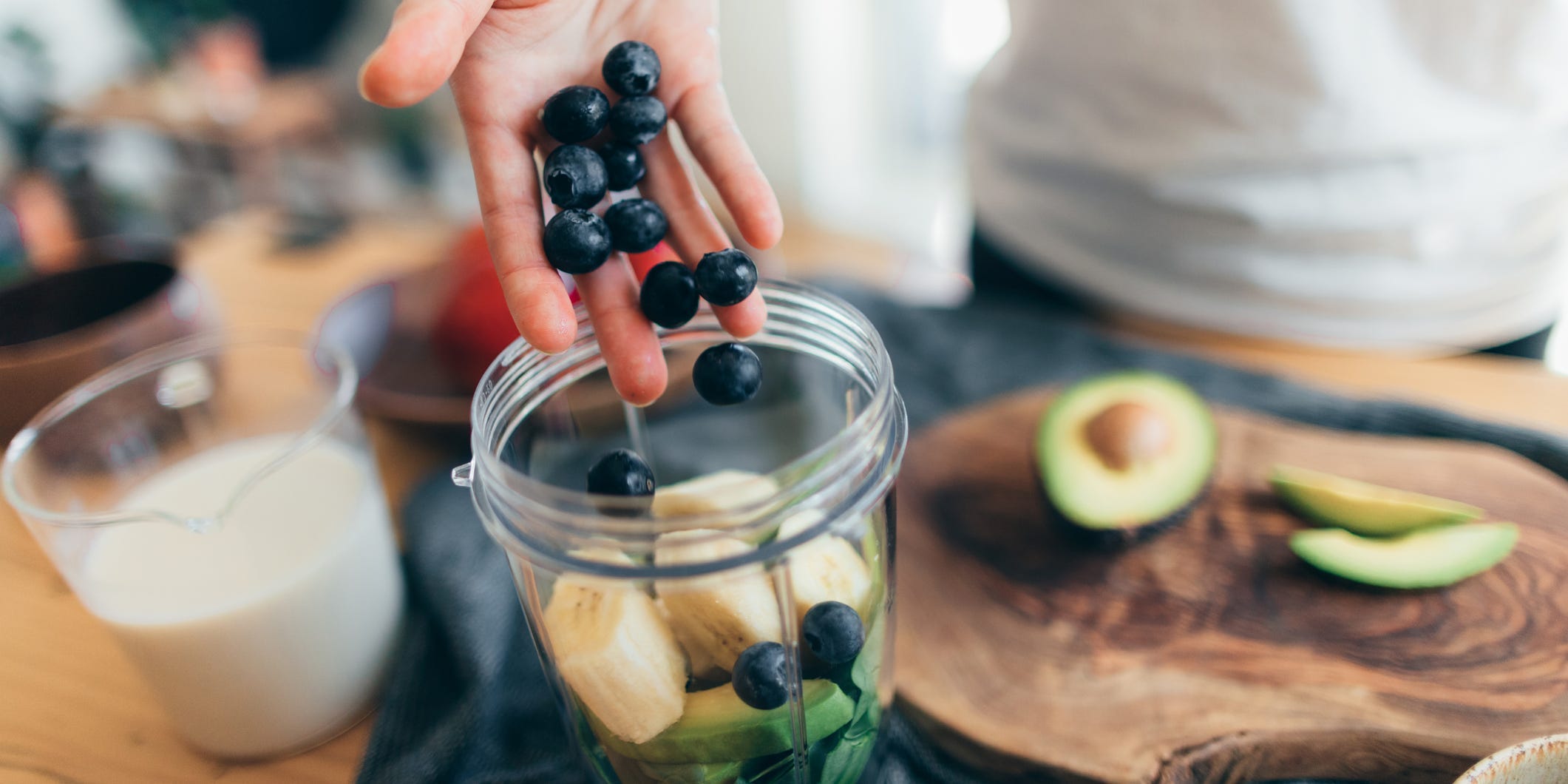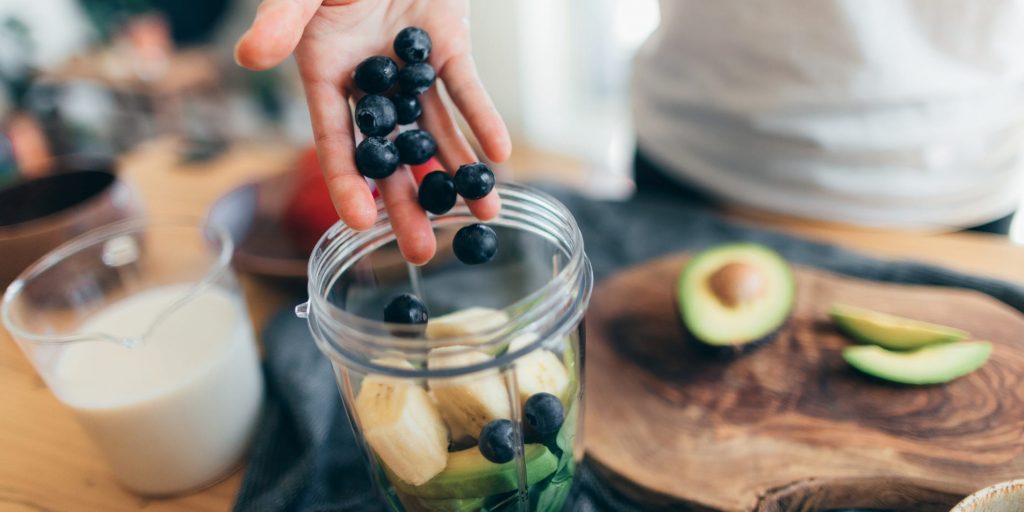
- Healthy smoothies contain a balanced mix of sugar, protein, and fiber.
- Don't overload your smoothie with fruit and juice because it could cause blood sugar spikes.
- Focus on a mix of fruit, veggies, and a protein source like apples with carrots and Greek yogurt.
- Visit Insider's Health Reference library for more advice.
Smoothies can be a fast and easy way to meet your daily needs for vegetables, fruit, protein, fiber, and many vitamins and minerals.
But not all smoothies are created equal, and that's important to know since the global smoothies market hit $20.3 billion in 2020 and is expected to reach $34.2 billion by 2027.
What you put into your smoothie matters as the wrong ingredients can make a smoothie more similar to a sugar-loaded soda than a health drink, says Wendy Lord, a registered dietitian in private practice.
Below, experts share tips for blending a healthier beverage — plus some nutrient-dense smoothie recipes to try at home.
Are smoothies healthy?
Smoothies can be healthy if they have a balanced mix of ingredients.
Lord says that ideally, a smoothie should contain the following:
- One serving of fruit
- At least one serving of vegetables
- A source of protein (Greek yogurt, cottage cheese, silken tofu, etc.)
- A bit of healthy fat (avocado, flax seeds, hemp seeds, peanut or almond butter, etc.)
- Optional: complex carbohydrates (oats, chickpeas, sweet potato, etc.)
This combination of protein, fat, and fiber makes the smoothie more satiating, and slows the release of sugar from the fruit into the bloodstream, subsequently preventing a spike in blood sugar, says Lord.
This is important because frequent blood sugar spikes and crashes can increase your risk of a number of health problems, including insulin resistance and diabetes.
Smoothies that are mostly made of juice, syrup, and fruit are not as healthy because they are more likely to jack up the calorie count and spike your blood sugar. Therefore, when making or purchasing a smoothie, try to avoid the following ingredients:
- Juice. Juice is loaded with sugar and lacks protein or fat for satiety. Instead, opt for a dairy-alternative like almond milk.
- Honey. If you want a thicker consistency, try some yogurt instead.
- Agave syrup. Try a dash of vanilla extract with some cinnamon for an added flavor boost without the sugar.
The calorie content for a smoothie can range vastly. According to Cory Ruth, RDN, the CEO of The Women's Dietitian, a homemade smoothie will typically fall within the 300-500 calorie range, while store-bought blends can run up to 800 calories or more.
The best way to ensure your smoothie offers maximum nutrients with a reasonable amount of calories and sugar is to make it at home. Below are some dietitian-approved recipes to get you started.
1. Orange mango creamsicle smoothie
Ingredients:
- 1 cup peeled Cara Cara oranges
- 1/2 cup frozen mango
- 1 cup ice
- ¼ cup plain Greek yogurt
- 1 cup water or almond milk
- 1 scoop vanilla protein powder
- 1 tsp. vanilla extract
Calories: 400-500
Thanks to the oranges, Schlichter says this smoothie is loaded with immune-boosting vitamin C and the protein powder and Greek yogurt provide ample protein to keep you full for longer while helping to maintain and build muscle.
2. Nutty apple smoothie
Ingredients:
- 1 small green apple
- 1 small carrot, grated
- 2 tbsp. oats
- ½ cup water
- ⅓ cup vanilla Greek yogurt
- 1 heaping tsp. peanut butter
- ⅓ cup ice cubes
Calories: 280-325
This smoothie is especially high in fiber, says Lord — packing roughly 8.3 grams — thanks to the combination of carrot, oats, and apple. Fiber-filled foods not only help to control blood sugar levels but also take longer to digest, thus helping to stave off hunger pangs.
3. Chocolate-covered raspberry smoothie
Ingredients:
- 1 ¼ cup unsweetened vanilla almond milk
- 1 scoop chocolate protein powder
- ½ frozen banana
- ½ cup frozen raspberries
- 2 tbsp. shredded coconut
- 1 tbsp. cocoa powder
- Pinch of cinnamon
Calories: 350
Don't be fooled by the indulgent taste of this dessert-inspired smoothie: Ruth says it's packed with healthy ingredients. Raspberries happen to be one of the highest-fiber fruits, while coconut contains healthy fat in the form of medium-chain triglycerides, which have been shown to lower "bad" LDL cholesterol as well as help with modest weight loss and fat burning.
4. Spiced kiwi smoothie
Ingredients:
- 1 ¼ cup unsweetened vanilla almond milk
- 2 scoops vanilla collagen peptides (a supplement found at most groceries)
- 1 chopped frozen kiwi
- 1 cup frozen cauliflower
- 1 tbsp. cashew butter
- ½ tsp. turmeric
Calories: 350
One cup of cauliflower contains 16.6 micrograms of bone-strengthening vitamin K — 18.4% of the RD for women and 13.8% of the RD for men. Meanwhile, Ruth notes that turmeric has well-studied antioxidant and anti-inflammatory properties: One 2017 review found it may even help reduce muscle soreness after exercise, thus helping to promote and speed up recovery.
5. Chia banana-berry smoothie
Ingredients:
- 1 cup frozen mixed berries
- ½ banana
- 1 tbsp. chia seeds
- ¼ cup plain nonfat yogurt
- ½ cup water
- Optional: small handful ice cubes
Calories: 360
Strawberries are a rich source of antioxidants, which promote heart health while reducing inflammation and "bad" LDL cholesterol, says Lord.
Chia seeds contribute a filling combo of protein and fiber as well as heart-healthy omega-3 fatty acids. A 2016 review found chia seeds contain a variety of compounds that may have anti-aging, anti-cancer, and cardioprotective benefits.
6. 6C smoothie
Ingredients:
- 1 scoop collagen protein powder
- 1 tbsp. cacao powder
- ¼ tsp. cinnamon
- ¼ tsp. cardamom
- 1 tbsp. almond butter (or other unsweetened nut butter)
- 1 tsp. MCT Oil
- 1 tsp. moringa powder
- 10 drops liquid monk fruit sweetener
- ½ cup frozen cauliflower
- Small greenish banana
- ⅔ cup unsweetened coconut milk
- ½ cup ice cubes
Calories: 325-375
Lauren Slayton, MS, a registered dietitian and founder of Foodtrainers, says this is one of her go-to blends, in part due to the addition of moringa: This powder, which is extracted from leaves of the moringa tree, is not only high in antioxidants but may help lower cholesterol. It also acts as a diuretic, says Slayton, meaning it can help relieve bloating.
7. Blueberry basil smoothie
Ingredients:
- 1 cup blueberries
- ½ banana
- Large handful of spinach
- Small handful of fresh basil
- ¼ - ½ avocado
- 1 scoop vanilla protein powder
- ½ cup milk of choice
Calories: 450
Meghan Pendleton, a registered dietitian with a virtual private practice, likes this blend because blueberries are rich sources of polyphenols, compounds known to reduce inflammation and oxidative stress, thus reducing the risk of many chronic diseases like cancer and heart disease.
Additionally, spinach provides plenty of carotenoids that are converted into vitamin A, which supports healthy vision and immune function. Avocado is a great source of B vitamins, which help your body better use the foods you eat for energy and absorb essential nutrients like vitamins A, D, E, and K.
Insider's takeaway
Smoothies can definitely be a healthy addition to your diet — as long as they're made with whole fruit and vegetables and contain a balanced blend of protein, fiber, and healthy fats. Fiber is particularly important, as it helps you avoid blood sugar spikes from the fruit.
A homemade smoothie tends to be much healthier than a store-bought one, which may have hidden calories from sweetened juices or other added sugars.
For a healthy, filling smoothie, dietitians recommend adding satiating ingredients like Greek yogurt, protein powder, nut butter, and complex carbohydrates.
